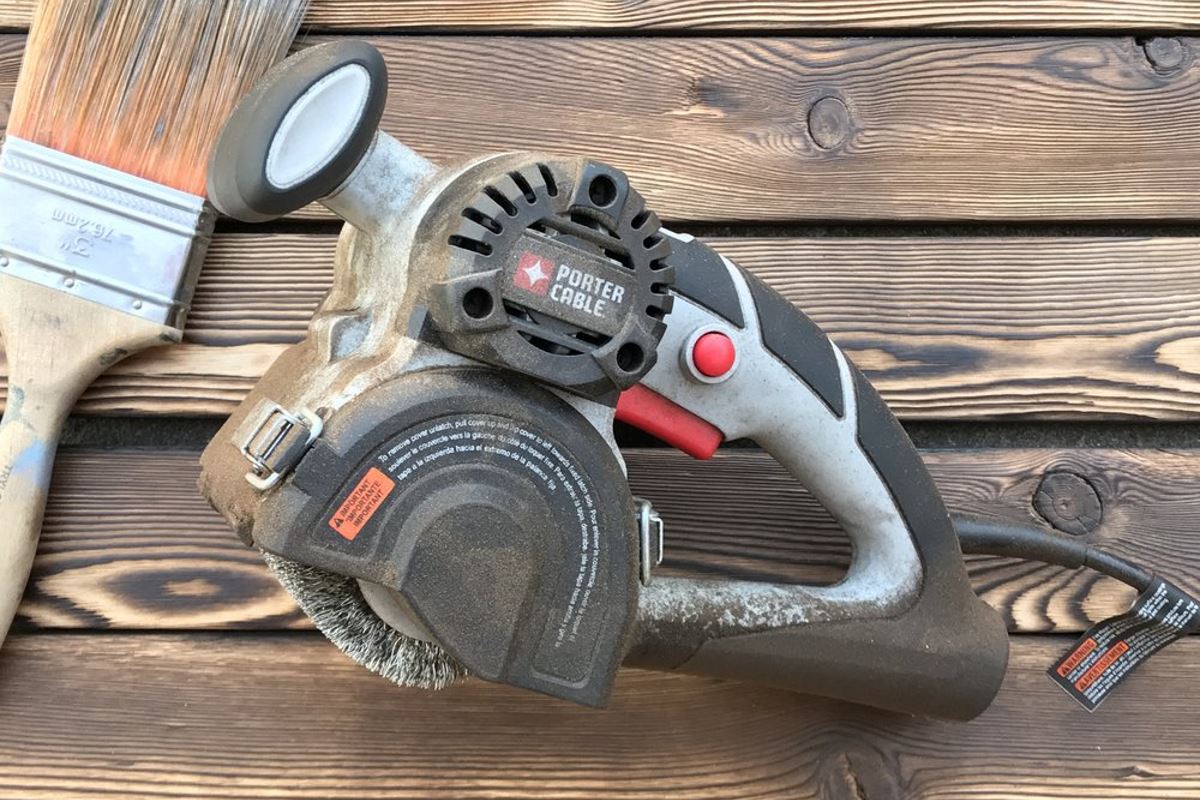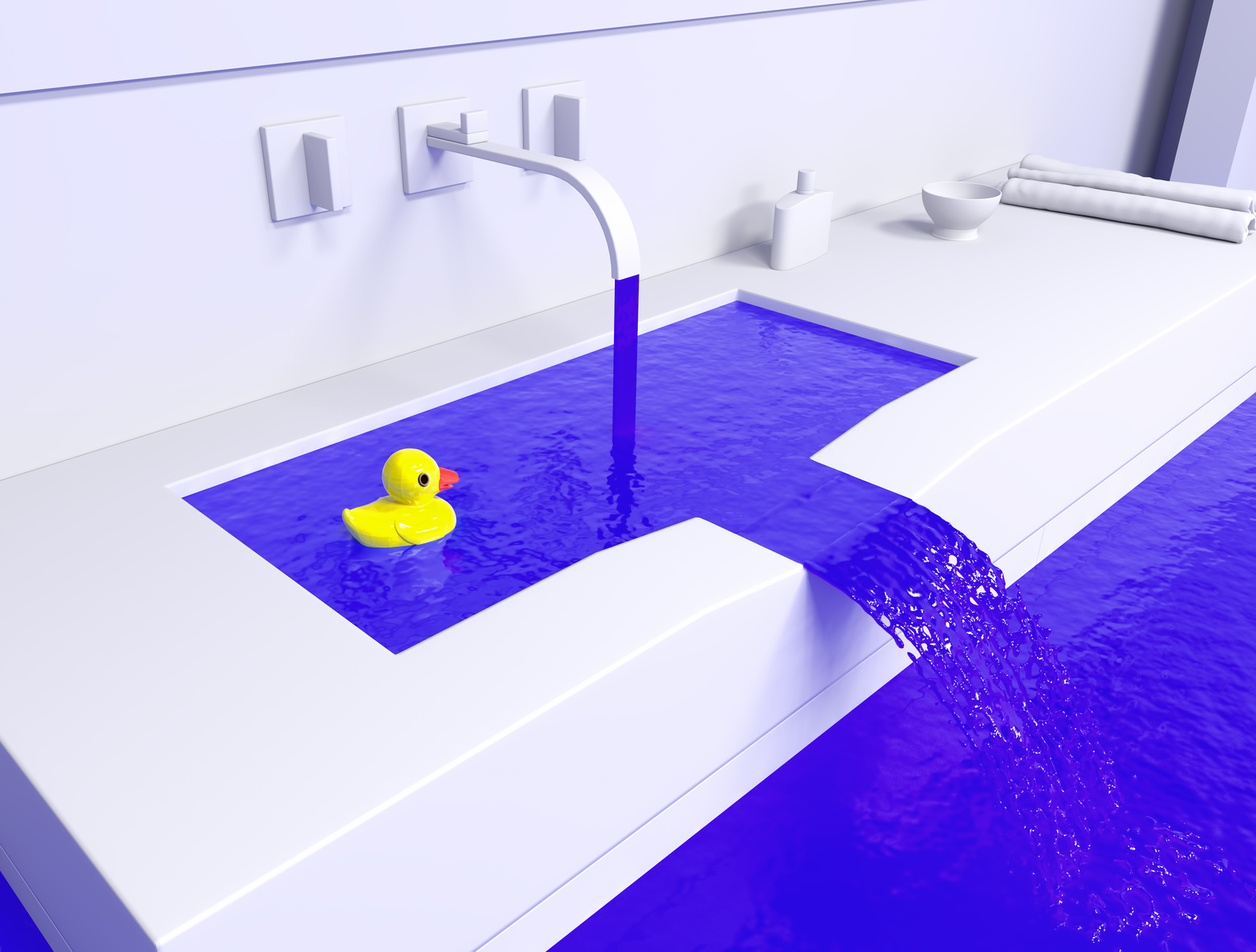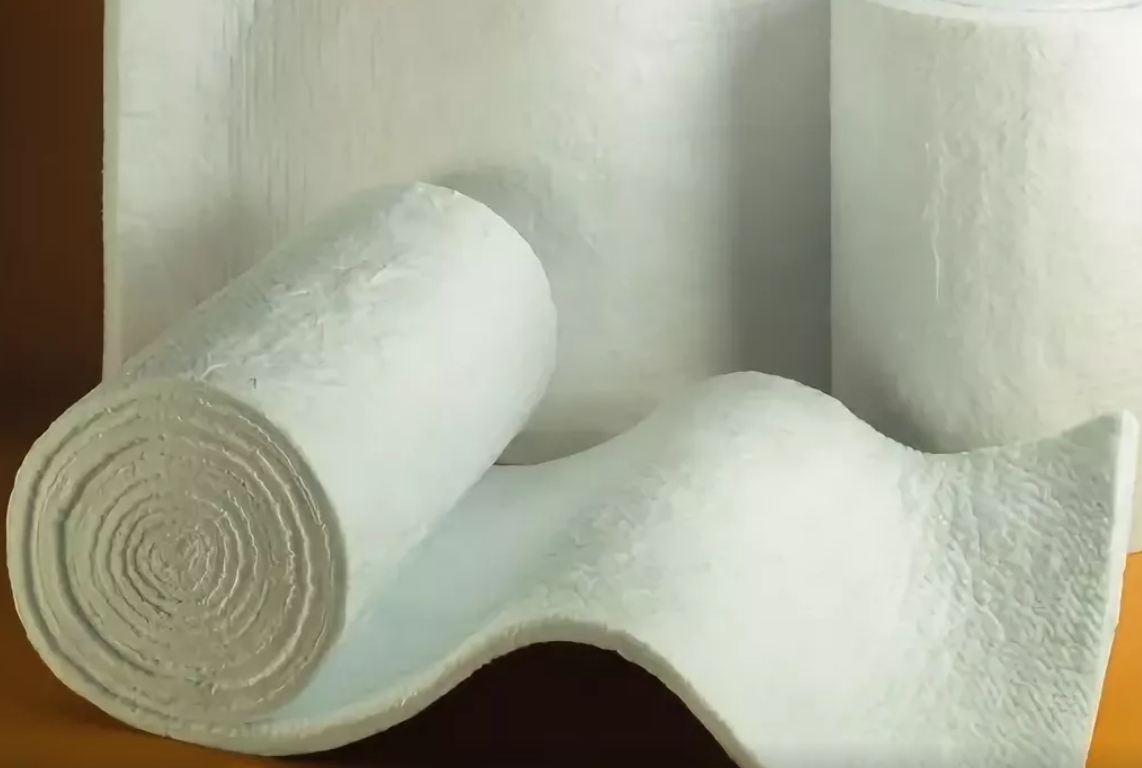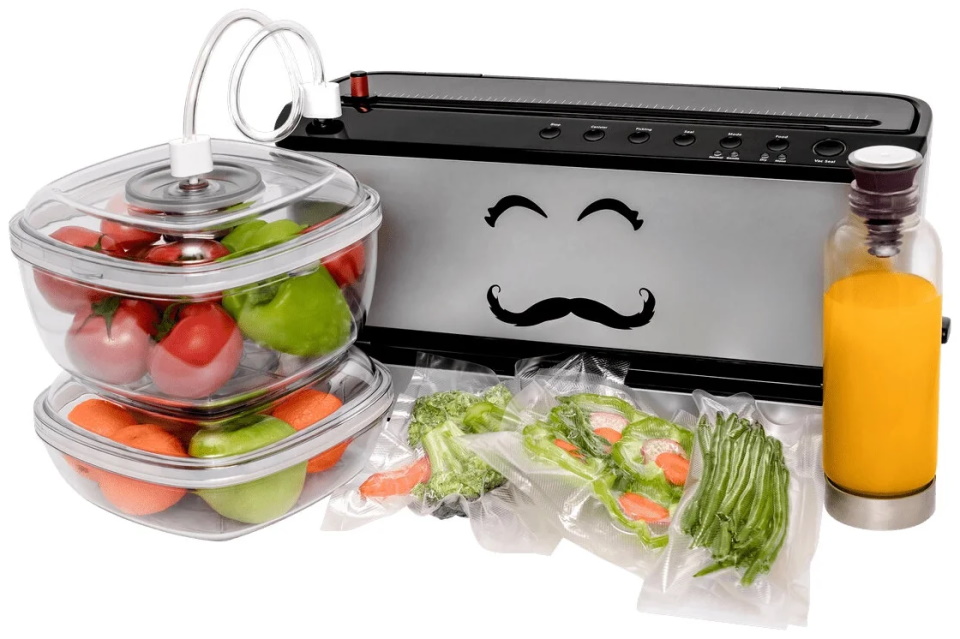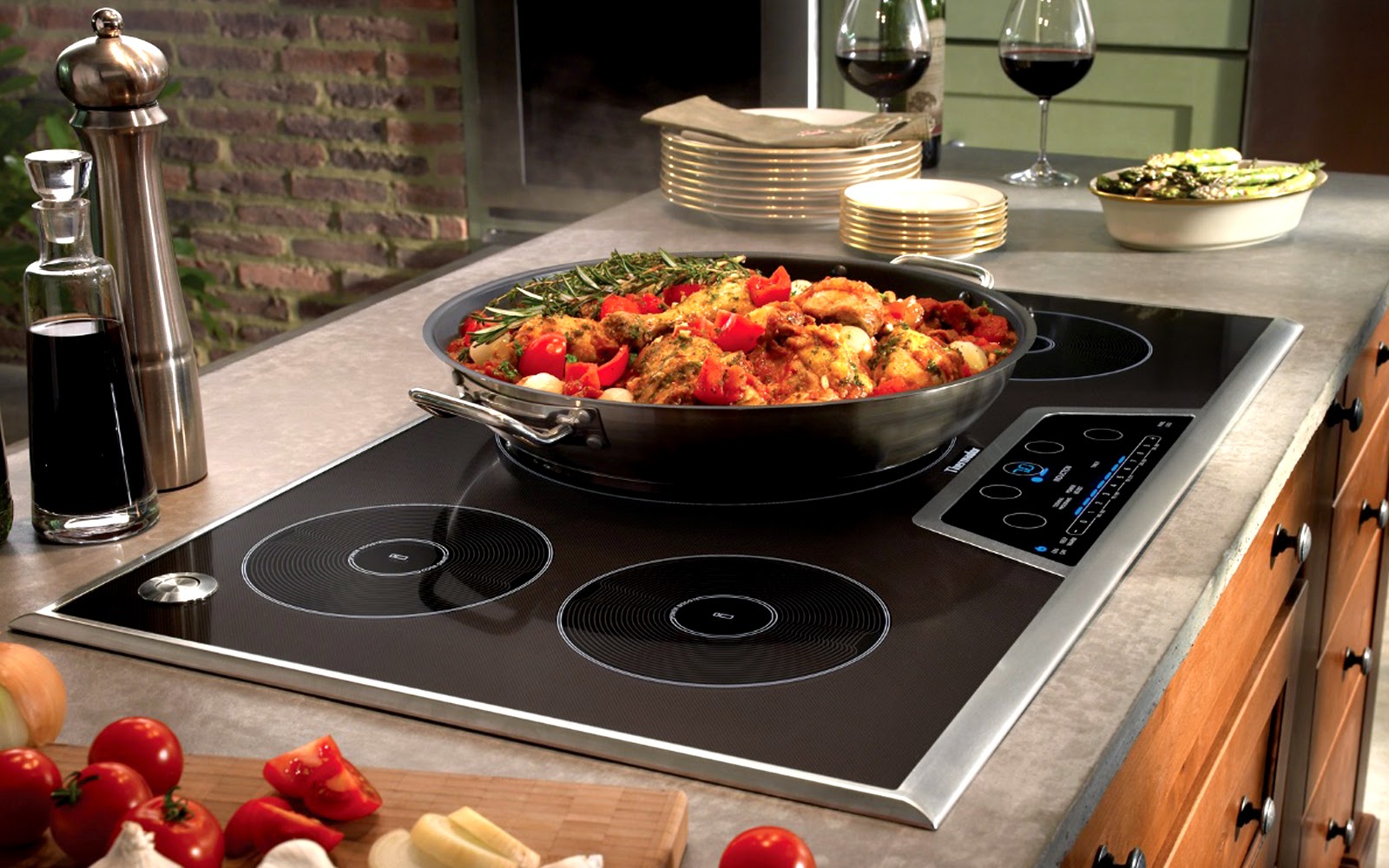Rating of the best insufflators for 2025
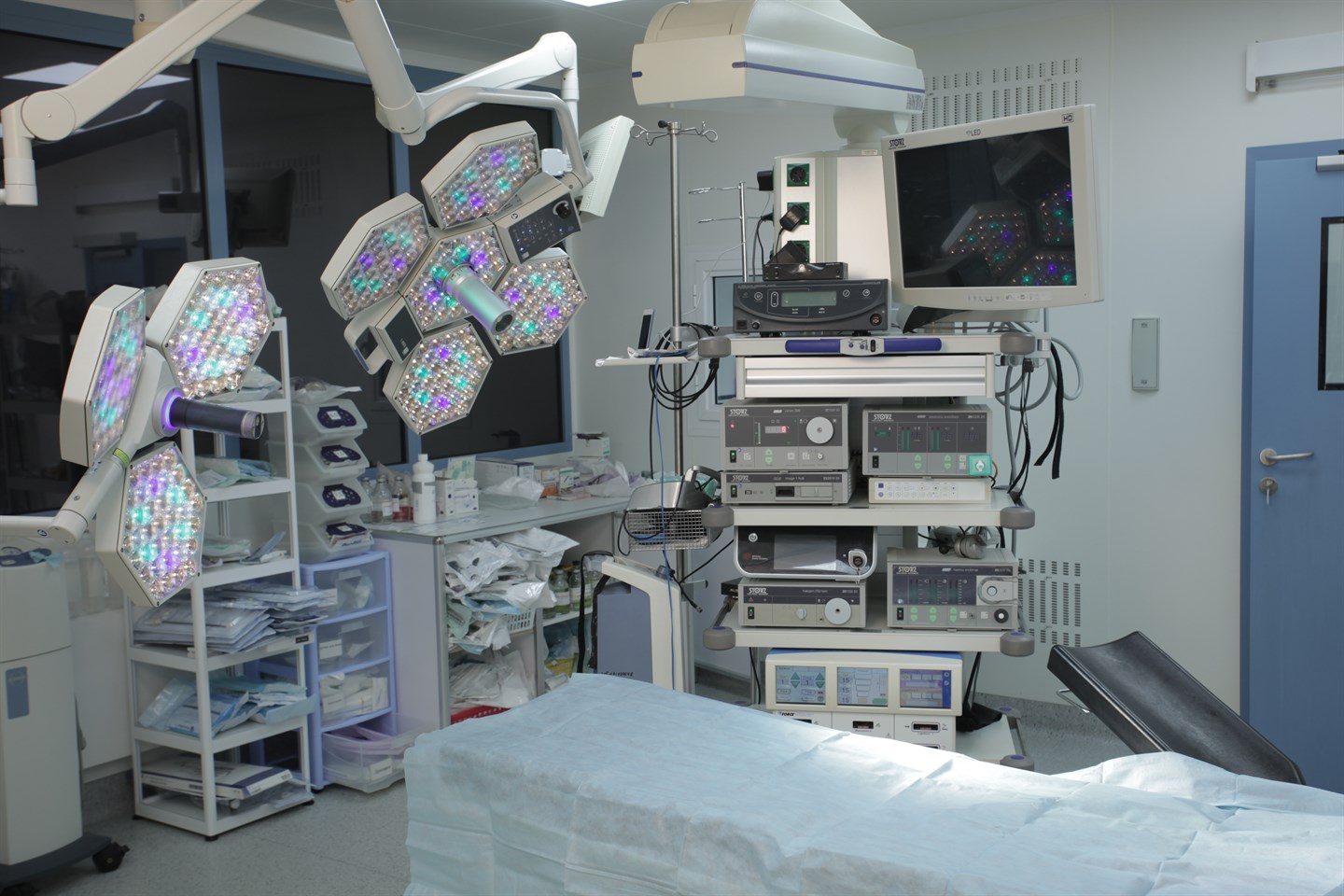
Most endoscopic examinations of patients conducted in medical institutions use special devices. They are called insufflators. What is their role in the survey process? How do they make the work of doctors easier? Let's try to understand these and other questions.
Content [Hide]
- 1 Rationale for application
- 2 Purpose
- 3 Rating of the best devices for supplying gas to the cavity for 2025
- 3.1 Endoscopic insufflator "Endomedium"
- 3.2 Endoscopic Insufflator F102
- 3.3 Device for supplying gas to the cavity F104
- 3.4 Bariatric endoscopic insufflator 50 L
- 3.5 Device for supplying gas to the cavity 30L
- 3.6 Endoflator SCB
- 3.7 Thermoflator SCB
- 3.8 Comfort Cough Seoil Pacific 1
- 3.9 Conmed GS1002
Rationale for application
In order for the surgeon to fully visually inspect the area requiring his intervention, it is necessary to create comfortable conditions. Assistance in such situations is provided by devices that supply liquid or gas to the human cavity.Due to this, the necessary pressure is created inside, which ensures high-quality manipulations by the doctor. Therefore, insufflators have become an integral part of the surgical room.
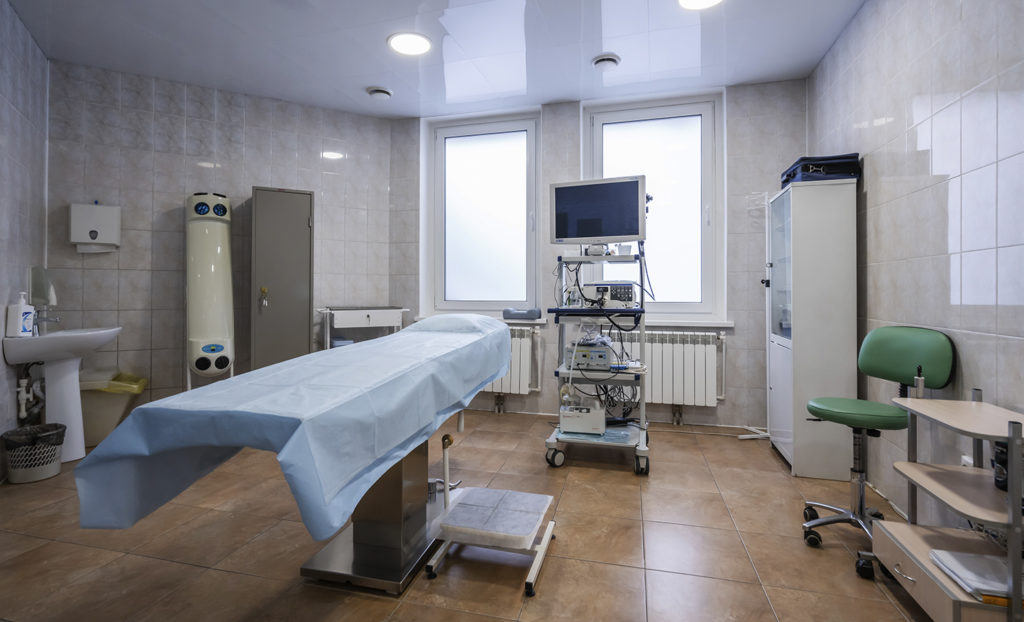
Purpose
The significance of these devices lies in the continuous supply of special medical gas to the cavity where the surgical intervention will take place. The outcome of the operation and the further condition of the patient depend on its exact dosage and the required rate of supply of the substance. Therefore, there is no need to talk about the level of requirements in such situations. It must definitely be very high. Developed using unique technologies and fully automated, the devices allow precise dosage and uninterrupted supply of the required amount of gas throughout the entire operation.
The medical carbon dioxide used in insufflators is safe for human health. It is not capable of smoke formation, does not support the combustion process, is not explosive, and is also quickly absorbed. Most insufflator models run on this gas.
Working Method
These devices are designed in such a way that they can be "powered" by both a low pressure system and a high pressure cylinder. In the first case, the substance is fed directly into the dosage and purification design. But manufacturers warn that when working with bottled gas, a reducer must be installed between it and the device. If this is not done, then quick damage to the insufflator is guaranteed.
Although the use of purified medical gas provides a sufficient level of safety, the vast majority of manufacturers additionally equip devices with filters. They are located in the exit part of the insufflator at the junction of the device with the tube leading to the patient.They capture even the smallest dispersed particles of the feed substance. Replacement of such parts is carried out after each operation and only by specialized craftsmen who have permission to carry out such work.
According to the attached instructions, a prerequisite when using a device for supplying gas to the cavity is that the insufflation tube must be removed from the patient after the operation is completed, but before the device itself is turned off. This is justified by the fact that if such a sequence is violated, an outflow of fluid from the organ into the tube may occur. To ensure sterility in subsequent operations, most manufacturers provide for the use of disposable parts. Therefore, together with the device, a set of insufflation tubes is included in the kit.
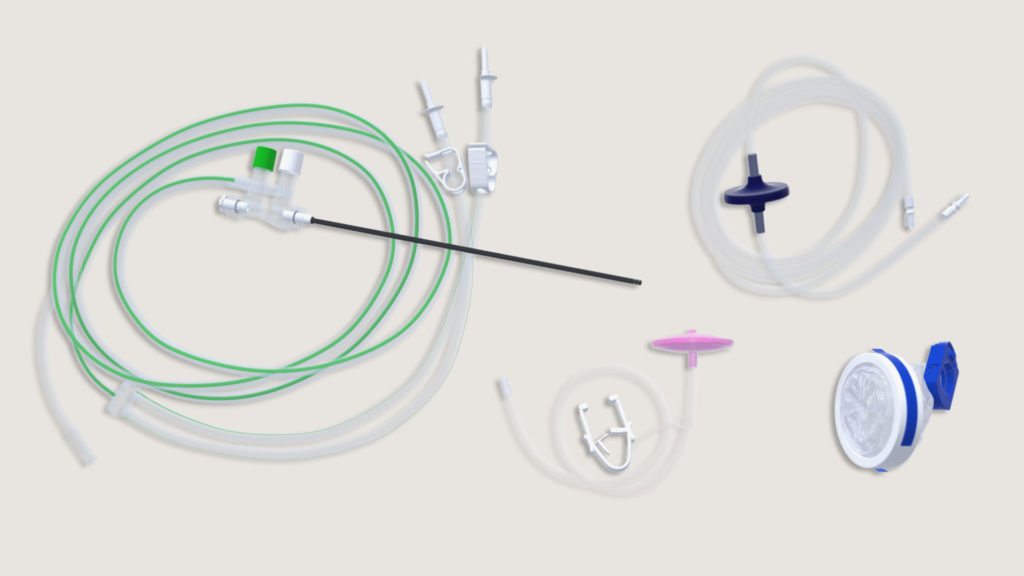
Most manufacturers produce products that supply gas in batches. That is, after creating the necessary pressure, the supply of the substance stops. Further, the device monitors its level. As soon as the indicator decreases, the device turns on again and continues to supply gas until the specified pressure is restored.
The bulk of the purchased devices are 16-20-liter insufflators with an average flow rate. They are enough for most laparoscopic manipulations. In addition, they are considered more practical and convenient. But along with them, there are also devices with a higher speed, reaching from 30 to 50 liters per minute. Such devices are used for operations of increased complexity and duration. Therefore, depending on the speed of the insufflators used, suitable instruments are used. So, for high-speed gas supply, trocars will be acceptable, since they have a high throughput.For slow speeds, doctors recommend using a Veress needle.
In devices with a high gas flow rate, a substance heating system is recommended for use. This is due to the fact that with a rapid replacement of gas in the patient's cavity, it may cool down during manipulations, which is highly undesirable. Such a system is installed directly in the tube leading from the insufflator to the patient.
Since excess pressure in the patient's cavity causes negative consequences, each surgeon must keep three main parameters under control during the operation:
- the actual pressure level of the operated area;
- the speed of the supplied gas;
- the amount of substance consumption in the process of manipulation.
To warn about pressure above the norm, the insufflators are provided with sound signals, which make it possible to respond to the problem in time and immediately eliminate it.
The following situations are also considered emergency:
- kink or break in the hose supplying gas to the cavity;
- low pressure in the gas cylinder;
- an increase in the value of abdominal pressure by 3 mm Hg from the set value.
Among the common models, a special place is occupied by instances with a touch screen. According to doctors, this is very convenient. The display shows all the set and real parameters of the device with the possibility of setting them individually.
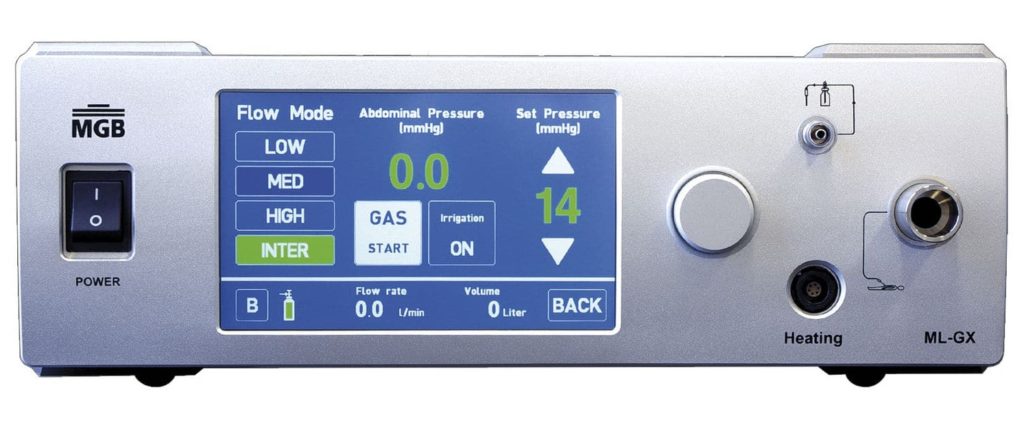
So, on the sensor you can see:
- gas supply rate;
- the level of actual pressure in the cavity of the human body;
- the periodicity of the movement of matter;
- heating mode;
- indication of the actual gas velocity.
Rating of the best devices for supplying gas to the cavity for 2025
At present, insufflators of many foreign and domestic brands are presented on the consumer markets, which successfully compete with each other and give an incentive to constantly improve their inventions. Along with imported goods, Russian devices are in no way inferior in terms of quality, but at the same time they have a lower cost. Therefore, many medical institutions prefer domestic manufacturers.
Endoscopic insufflator "Endomedium"
votes 1
This device is an electronic and fully automatic intracavitary pressure device. The programmed modes and values allow you to quickly compare and detect deviations of the parameters during the operation and notify the surgeon in a timely manner of their presence. When carrying out endoscopic manipulations, the "Endomedium" insuffulator controls 8 input measurements at once, which are observed throughout the entire process. At the slightest deviation from the required parameters, the device independently, in addition to beeping, adjusts the desired mode or speed.
The device is equipped with an exufflation function, which ensures the release of excess pressure from the cavity in case of exceeding its required pressure.
This device, when connected to gas supply lines, does not need a pressure reducer, since the inlet pressure maintained by it is 7 atmospheres.
Characteristics:
- maintained pressure in the cavity 3-30 mm Hg;
- gas flow rate max - 40 l per minute;
- gas flow rate min - 2 l per minute;
- speed setting - manual;
- the number of programmable modes of substance supply - 3;
- gas pressure at the inlet - from 0.30 to 0.70 MPa;
- maximum consumption volume of the substance - 99 l;
- availability of emergency notification;
- display on the display of the set and actual readings of the substance supply rate and pressure;
- operation from the central gas supply line is possible.
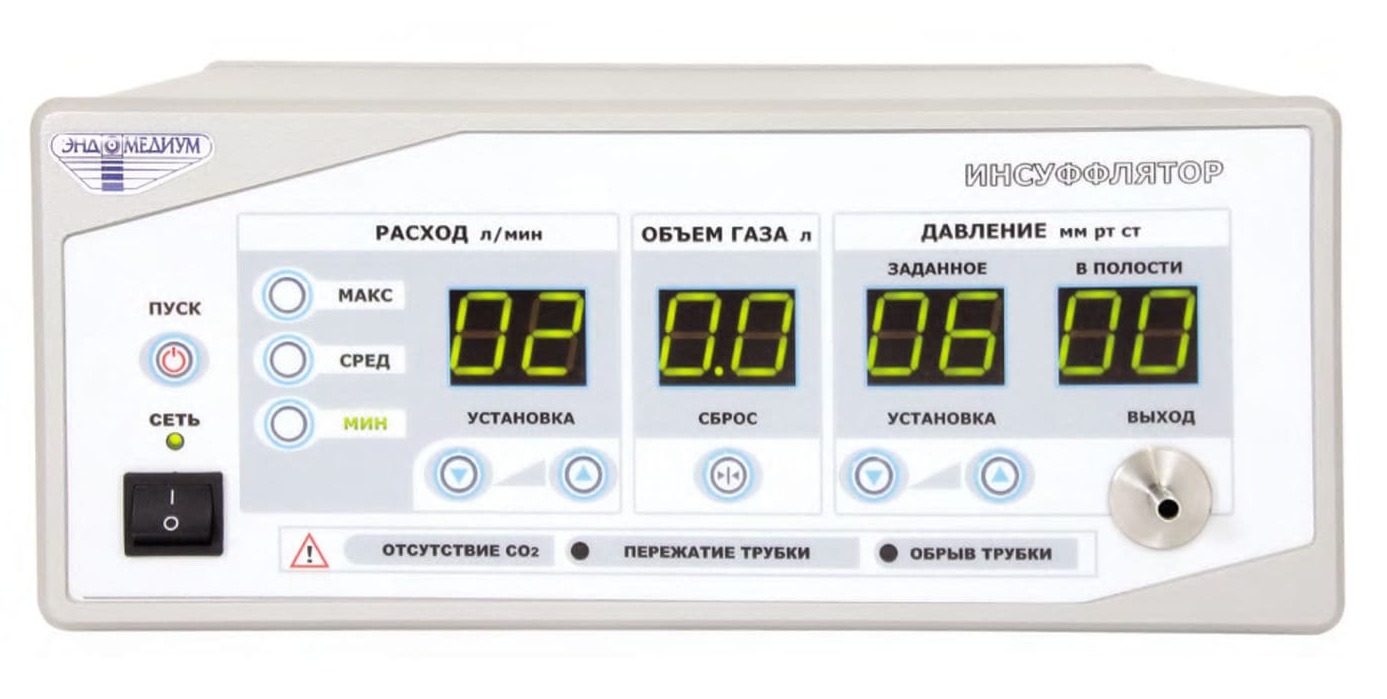
- high work accuracy;
- equipped with an exufflation function;
- automatic adjustment and switching of the modes of feed rates of the substance;
- the presence of sound and visual signals;
- noise absorbing system;
- four-stage protection;
- saving data;
- full set.
- not identified.
Endoscopic Insufflator F102
votes 1
This device is designed to supply gas to the patient's abdominal cavity during various types of laparoscopic interventions. It effectively and smoothly generates the necessary pressure and maintains its constant value throughout the entire operation. Manual setting of the required parameters provides convenience and ease of use.
The F102 insufflator is powered by a gas cylinder.
Characteristics:
- gas supply rate - up to 20 l per minute;
- pressure range - from 1 to 30 mm Hg;
- apparatus weight - 7 kg;
- parameters - 26.7 x 13.8 x 41 cm;
- I class of protection;
- required power supply - 100-240 V;
- the optimal frequency is 50-60 Hz.

- high efficiency;
- ensuring uninterrupted operation;
- the presence of an alarm;
- ease of use;
- good equipment.
- not detected.
Device for supplying gas to the cavity F104
votes 1
This model is a convenient and simple device, easily configured in manual mode. The ability to set parameters in several language variations allows it to be used by doctors from different countries.The gas flow rate reaches up to 40 liters per minute, which ensures high efficiency during long and complex operations. The device is equipped with an emergency pressure relief function when the set value is exceeded. A significant advantage of this model is the heating of the supplied substance during manipulations.
Characteristics:
- the range of pressure created is 1-30 mm Hg;
- maximum power consumption - 145 W;
- optimal frequency - 50-60 Hz;
- weight - 7 kg;
- parameters - 26.7 x 13.8 x 41 cm.

- high gas flow rate;
- the possibility of using for a long time;
- ease of setting the necessary parameters;
- high quality of work;
- the presence of a heating function;
- safety for doctor and patient.
- not found.
Bariatric endoscopic insufflator 50 L
votes 1
The model is presented by the Lemke manufacturer, which has established itself as a reliable and high-quality manufacturer. This device is designed for minimally invasive manipulations in children and is equipped with the function of heating the gas flow during surgical interventions. It is delivered to its destination through a trocar. This helps to minimize risks during procedures.
The small size of the device allows it to be used even in small rooms. The presence of a touch screen provides simplicity and convenience in setting up and controlling the set parameters during the operation. The quality of this product is very high and meets all the necessary requirements and conditions. This is confirmed by the popularity of the device and its use in leading medical institutions throughout Europe.
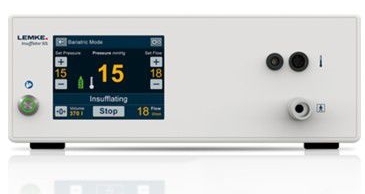
- simplicity and ease of use;
- the presence of a touch screen;
- safety and comfort in use;
- high efficiency;
- quality material;
- production according to the latest technologies;
- excellent kit.
- not identified.
Device for supplying gas to the cavity 30L
votes 1
The endoscopic device, manufactured using unique Lemke brand technologies, is designed to perform minimally invasive procedures in the adult population. The high efficiency of this device allows uninterrupted and full supply of heated gas into the abdominal cavity. This approach eliminates the patient's discomfort during the procedures. Equipped with the function of emergency discharge of excess gas, the insufflator instantly responds to deviations in the set head value. High-quality raw material, safety in operation and high performance of the device are ensured by several levels of quality control carried out during the manufacturing process.
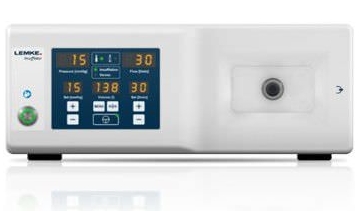
- simplicity and ease of use;
- universality;
- the presence of a touch screen;
- the presence of a pressure relief function;
- exclusion of the possibility of infection when applying the substance;
- complete and high quality equipment.
- not found.
Endoflator SCB
votes 1
This product is a high-quality and safe for the patient device that provides gas supply to the cavity during surgery. It is also used in open heart surgery. This device operates in two modes of substance supply. Equipped with a keypad, Endoflator SCB allows you to quickly and accurately set the required parameters.And adjacent screens, one of which shows the specified values, and the second - their actual values, provide constant monitoring of their changes during the operation. In case of an unplanned increase in pressure inside the cavity, Secuvent’s audible and visual alarm system will immediately notify the doctor about this. After that, the excess value is reduced.
Characteristics:
- pressure range - 0-30 mm Hg;
- gas supply rate varies from 0 to 20 liters per minute;
- operates from a central gas line with a pressure of less than 7 bar;
- supplies the substance in low or high pressure mode.
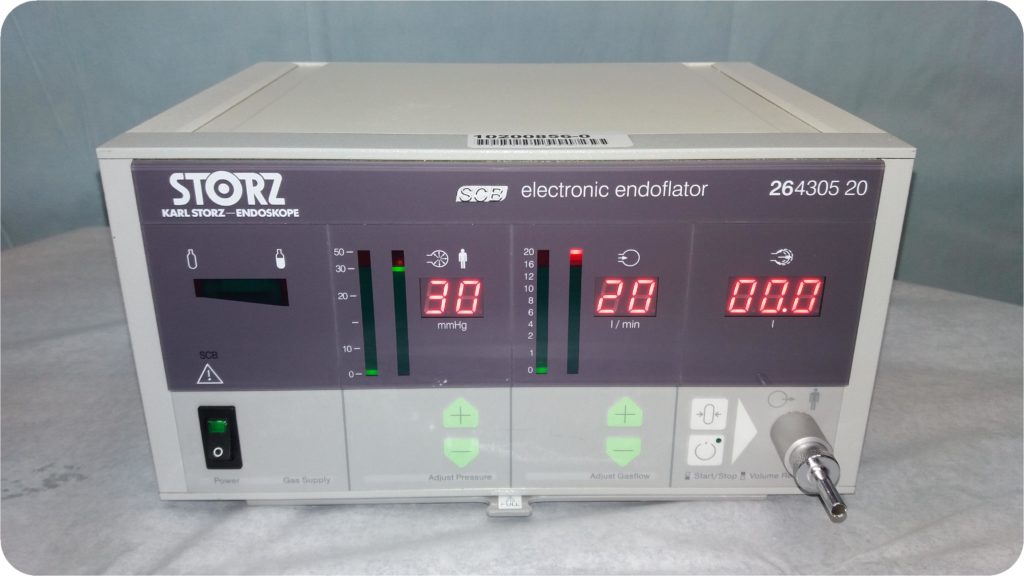
- ease of use;
- convenience in setting indicators;
- implementation of current control over changes in values;
- the presence of an alarm system;
- high efficiency.
- not found.
Thermoflator SCB
votes 1
This model is a device for high-speed carbon dioxide supply into the cavity for high-quality and safe surgical procedures for the patient. The rate of delivery of the substance to the required area is 30 liters per minute. The parameters settings are controlled using the keypad. It also contains two screens that allow you to track changes in indicators during the operation and eliminate them in a timely manner. In addition, the safety system installed in the Thermoflator SCB also closely monitors deviations in the set and actual parameters. When they are detected, a visual and audible signal is given, warning the surgeon of the situation. In case of exceeding the permissible pressure inside the abdominal cavity, its emergency reduction is provided.
A significant advantage of this model is the presence of gas heating before it enters the cavity. This prevents cooling of the peritoneum and creates a more comfortable environment for the patient.
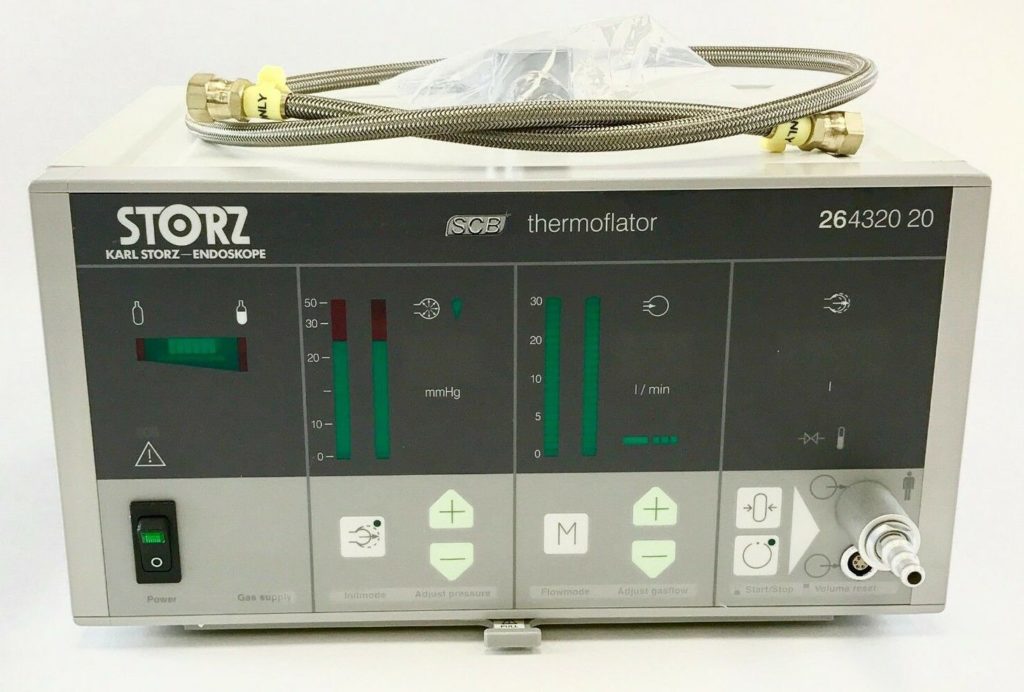
- high speed of gas supply;
- great quality;
- the presence of an alert system;
- the possibility of heating;
- ease of control.
- not identified.
Comfort Cough Seoil Pacific 1
votes 1
This device is an insufflator-aspirator. It is designed to enhance the cough reflex in adults and children from six months. When people have an absent or weakened cough syndrome, they are accompanied by frequent inflammatory processes of the respiratory tract (bronchi, lungs).
With such diseases, the use of artificial lung ventilation devices is not enough, since they work only to supply oxygen to the lungs. Unlike them, the insufflator-aspirator works both for inhalation and exhalation, provoking a cough. This is ensured by the implementation of alternating positive and then negative pressure in the airways, which causes coughing and, as a result, the outflow of sputum from the organs. Comfort Cough Seoil Pacific 1 also allows you to adjust the strength and frequency of delivery, adjusting them to the individual characteristics of the patient. The duration of inhalation, exhalation and the time between them can be performed both in automatic and manual mode.
The device is connected to the patient using a mask, mouthpiece or directly through the endotracheal and tracheostomy tubes.
This insufflator works from the central gas line, but in case of an emergency shutdown it is able to operate from the battery.
One of the advantages of this device is the memorization of indicators in the course of therapy and recording them in memory.
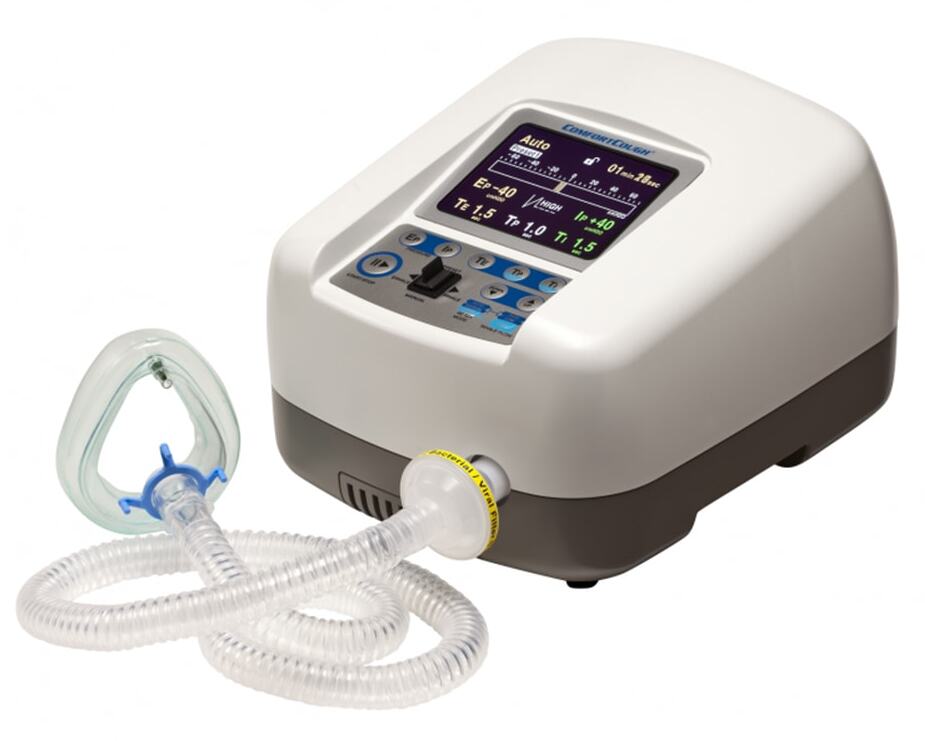
- high efficiency in work;
- great quality;
- the possibility of individual selection of parameters;
- fixing values in the device memory;
- universal use by adults and children.
- not detected.
Conmed GS1002
votes 1
The American-made insufflator is a universal device. It is used both in short-term invasive surgical interventions and in long-term and complex operations. This is ensured by the ability to supply gas to the patient from a minimum value of up to 40 liters per minute. The apparatus continuously supplies the substance to the required cavity and controls its constant value throughout the entire process. This is also reported by the video screen, which allows the surgeon himself to observe the state of pressure of the operated person.
Equipped with the function of heating the supplied gas, Conmed GS1002 protects the peritoneum from hypothermia and further uncomfortable conditions for the patient.
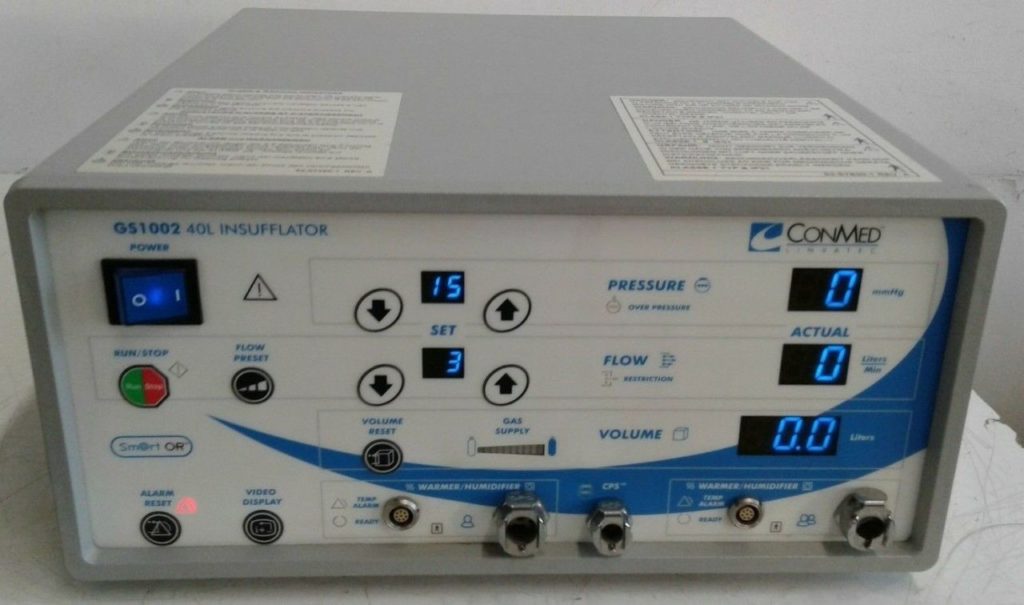
- great quality;
- high efficiency;
- universality;
- ease of use;
- heating function.
- not found.
Choosing medical equipment is not an easy task. After all, human lives depend on their quality. Therefore, the "novelties" of unfamiliar firms and manufacturers should be treated with caution. Experts recommend, in order to avoid all sorts of negative consequences, to tend to the choice of products of already well-known and popular manufacturers, whose products are partially presented in this article.
new entries
Categories
Useful
Popular Articles
-

Top ranking of the best and cheapest scooters up to 50cc in 2025
Views: 131653 -

Rating of the best soundproofing materials for an apartment in 2025
Views: 127694 -

Rating of cheap analogues of expensive medicines for flu and colds for 2025
Views: 124521 -

The best men's sneakers in 2025
Views: 124036 -

The Best Complex Vitamins in 2025
Views: 121942 -

Top ranking of the best smartwatches 2025 - price-quality ratio
Views: 114981 -

The best paint for gray hair - top rating 2025
Views: 113398 -

Ranking of the best wood paints for interior work in 2025
Views: 110320 -

Rating of the best spinning reels in 2025
Views: 105331 -

Ranking of the best sex dolls for men for 2025
Views: 104369 -

Ranking of the best action cameras from China in 2025
Views: 102218 -

The most effective calcium preparations for adults and children in 2025
Views: 102013
